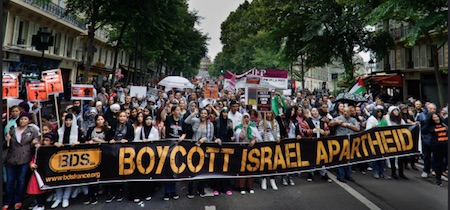Dutch foreign minister says BDS “protected by the freedom of expression” Irish foreign minister says BDS is a “legitimate political viewpoint” and that his department is monitoring Israel’s repression of BDS movement co-founder Omar Barghouti The Dutch and Irish governments have publicly stated that calls for a boycott of Israel are legitimate, with the Dutch foreign minister saying that advocating and campaigning for Palestinian rights through the nonviolent Boycott, Divestment and Sanctions (BDS) movement against Israel are “protected by the freedom of expression”. The statements dealt a serious blow to Israel’s relentless war of repression that has led governments in the UK, France, Canada and state legislatures across the US to introduce anti-democratic legislation and taking other repressive measures to undermine the BDS movement. Israel has also admitted that it is using its intelligence services to spy on BDS activists overseas. Irish foreign minister Charles Flanagan responded to a parliamentary question by Deputy Paul Murphy on Israel’s attacks on the movement saying that BDS is not supported by the Irish government but that it is a “a legitimate political viewpoint”. In response to a question regarding Israel’s travel ban and attempts to revoke the residency of BDS movement co-founder and human rights defender Omar Barghouti, Flanagan said that the Irish foreign ministry “will monitor the ongoing developments” and that “I do not agree with attempts to demonise those who advocate this [BDS] policy”. The Irish Congress of Trade Unions had called on the Irish government to pressure Israel to respect the rights of Palestinian human rights defenders. Israel has imposed a travel ban on Omar Barghouti, who lives in Acre in present day Israel with his family, and seems intent on revoking his residency to punish him for his BDS advocacy. In response to a similar question by Green Left MP Rik Grashoff, the Dutch Minister of Foreign Affairs, Bert Koenders, said that “Statements or meetings concerning BDS are protected by the freedom of expression and freedom of assembly, as enshrined in the Dutch Constitution and the European Convention on Human Rights.” Revealing that Israel regularly raises the topic of BDS in bilateral meetings with the Dutch government, Koenders reiterated his government’s opposition to the boycott of Israel but insisted that “endorsing BDS falls under freedom of expression.” Riya Hassan, Europe coordinator for the Palestinian BDS National Committee (BNC), the broadest coalition in Palestinian civil society that is leading the global BDS movement, said: “With the Netherlands and Ireland joining Sweden in defending the right to advocate and campaign for Palestinian rights under international law through BDS, Israel’s attempt to get BDS outlawed in Europe and to bully its supporters into silence have been dealt a serious blow.” In March 2016, the Swedish foreign ministry reaffirmed basic democratic principles by stating that BDS “is a civil society movement” and that “governments should not interfere in civil society organization views.” More than 350 European human rights organizations, trade unions, church groups and political parties, some of whom do not yet endorse BDS, have called on the European Union to support the right to boycott Israel in response to its occupation and violations of Palestinian rights. Similar statements have been made by Amnesty International and Human Rights Watch. Riya Hassan added: “Israel’s attacks on our movement appear to be backfiring as they have led to European governments and some of the world’s most famous human rights organisations and political organisations across Europe and the world speaking out in defence of our right to advocate BDS.More than 23,000 people have signed an appeal urging the UN to take measures to uphold and protect the rights of Palestinian, Israeli and international human rights defenders who campaign nonviolently for Palestinian rights, including through the BDS movement. The appeal will be sent to the UN High Commissioner for Human Rights in the coming few days. Hassan added: “We’re hugely grateful to each of the 23,000 people who signed our appeal urging the UN to protect our right to campaign for Palestinian rights, and we’re more optimistic than ever that Israel’s desperate legal, spying and propaganda war on our human rights movement will ultimately fail.” The impressive growth in recent years of support for the BDS movement in mainstream trade unions, churches and pension funds, as well as among student governments, academic associations, anti-racist movements, LGBTQ groups and artists across the world, has prompted the Israeli establishment to admit the strategic impact of BDS. The fact that large European companies such as Veolia, Orange and G4S are abandoning or announcing plans to leave the Israeli market following BDS campaigns is also particularly worrying for Israel. Israeli-induced attacks on free speech and civil rights in Europe, the US and Canada, among others, are seen by BDS campaigners as fostering an “ominous environment of bullying, intimidation and repression that has all the hallmarks of the era of McCarthyism in the US and the worst days of the apartheid regime in South Africa”. Fatin Al Tamimi, chairperson of the Ireland-Palestine Solidarity Campaign welcomed the government statement. Ms. Tamimi said: “At a time when our colleagues are being attacked in Britain, France, the US and elsewhere via anti-democratic legislation, it is refreshing that the BDS campaign has been recognised by the Irish Government as a legitimate and democratic movement for justice in Palestine. “It is, of course, disappointing that the government itself doesn’t actively support the BDS campaign at the moment, but nevertheless we will continue campaigning for sanctions, including an arms embargo, to be imposed on Israel until it complies with its intentional law and human rights obligations.” Source URL |
